九年级下册 Module 6 Eating together Unit 3 Language in use 课件(共19张PPT)
文档属性
| 名称 | 九年级下册 Module 6 Eating together Unit 3 Language in use 课件(共19张PPT) | 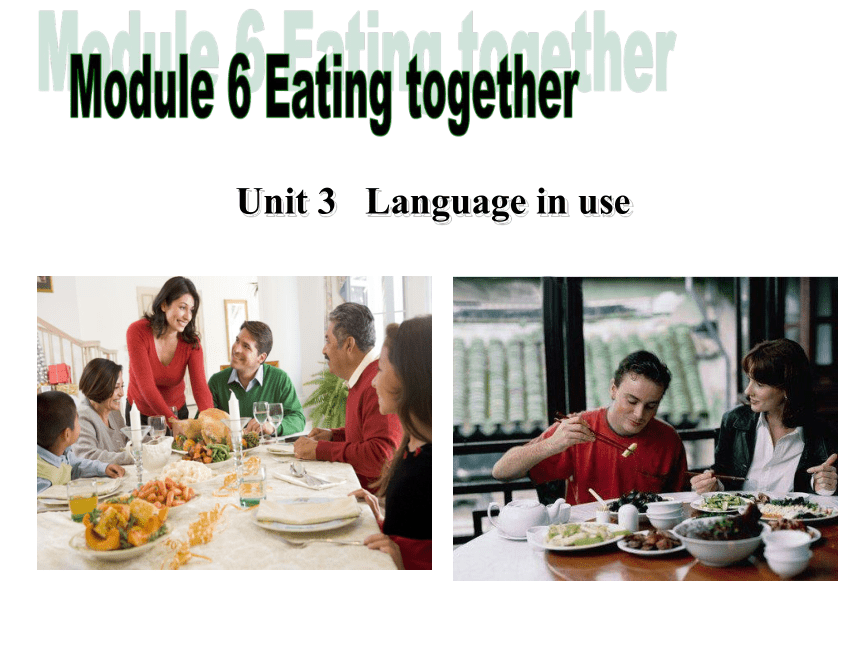 | |
| 格式 | pptx | ||
| 文件大小 | 6.5MB | ||
| 资源类型 | 教案 | ||
| 版本资源 | 外研版 | ||
| 科目 | 英语 | ||
| 更新时间 | 2023-03-15 16:19:14 | ||
图片预览

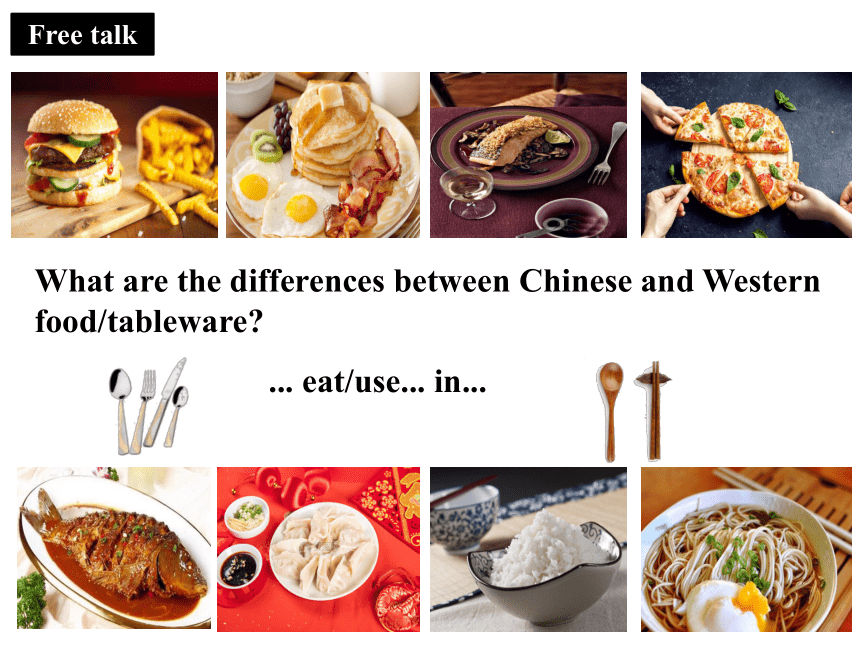
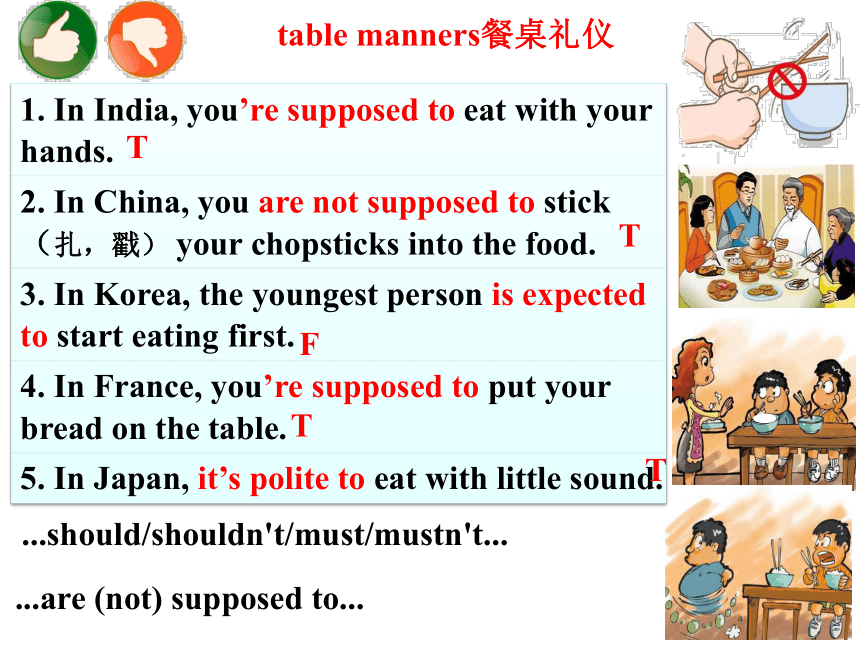
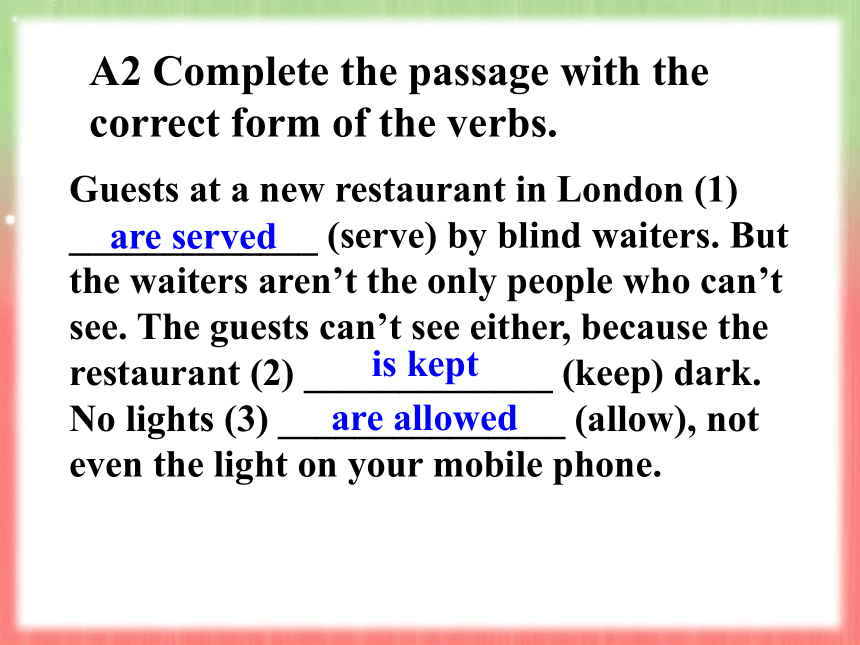
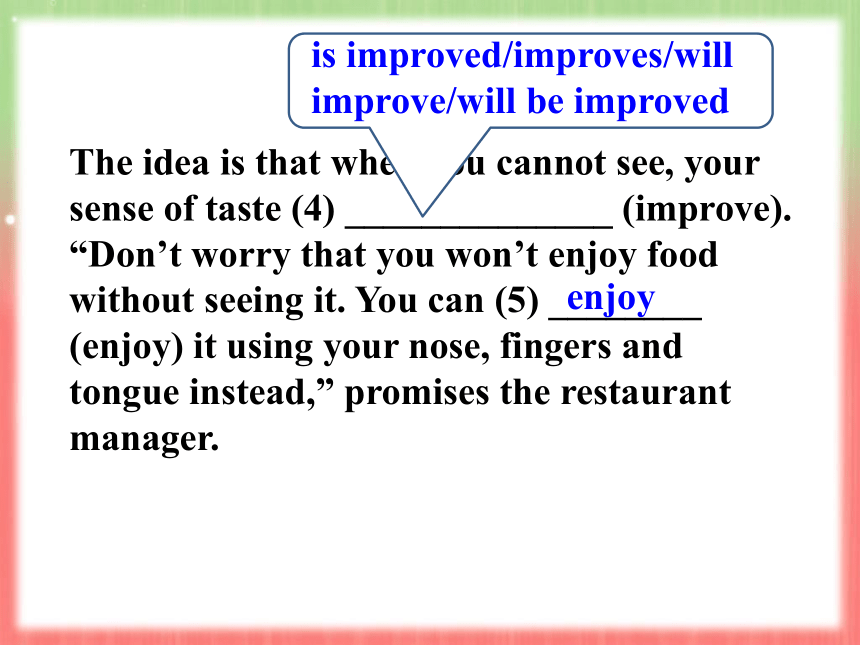

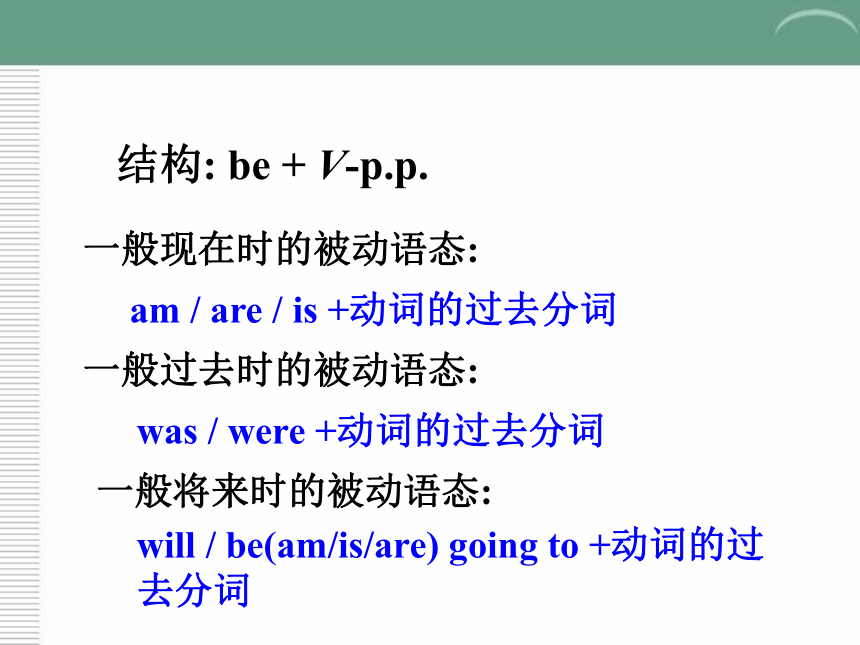
文档简介
(共19张PPT)
Unit 3 Language in use
Module 6 Eating together
Free talk
What are the differences between Chinese and Western food/tableware
... eat/use... in...
table manners餐桌礼仪
1. In India, you’re supposed to eat with your hands.
2. In China, you are not supposed to stick(扎,戳) your chopsticks into the food.
3. In Korea, the youngest person is expected to start eating first.
4. In France, you’re supposed to put your bread on the table.
5. In Japan, it’s polite to eat with little sound.
T
T
F
T
T
...are (not) supposed to...
...should/shouldn't/must/mustn't...
Guests at a new restaurant in London (1) _____________ (serve) by blind waiters. But the waiters aren’t the only people who can’t see. The guests can’t see either, because the restaurant (2) _____________ (keep) dark. No lights (3) _______________ (allow), not even the light on your mobile phone.
are served
is kept
are allowed
A2 Complete the passage with the correct form of the verbs.
The idea is that when you cannot see, your sense of taste (4) ______________ (improve). “Don’t worry that you won’t enjoy food without seeing it. You can (5) ________ (enjoy) it using your nose, fingers and tongue instead,” promises the restaurant manager.
is improved/improves/will improve/will be improved
enjoy
被动语态基本用法:
当句子的主语是动作的执行者时,谓语的形式是主动语态。当句子的主语是动作的承受者时,谓语要用被动语态。被动语态由“助动词be+过去分词”构成,时态通过be表现出来。
被动语态 (Passive Voice)
结构: be + V-p.p.
am / are / is +动词的过去分词
was / were +动词的过去分词
一般现在时的被动语态:
一般过去时的被动语态:
一般将来时的被动语态:
will / be(am/is/are) going to +动词的过去分词
We bought some books.
主动句与被动句之间的转换
Some books were bought ( by us )
主语 谓语动词主动语态的过去式 宾语
主语 谓语动词被动语态的过去分词 介词+ 宾语
Many people speak English. (主动语态)
English is spoken by many people.
The naughty boy broke the window yesterday. (主动语态)
The window was broken ( by the naughty boy) yesterday.
We will do this work at once. (主动语态)
This work will be done at once.
People are going put down some old buildings. (主动语态)
Some old buildings are going to be put down (by people).
② Food _______________ into the meeting rooms.
is served
A1 Write sentences to explain these signs.
① Lunch _________ daily form 12 pm to 2 pm.
should not be taken
③ The park _________ for picnics.
is open
④ Dogs ________________ in the restaurant.
are not allowed
The shop _______________ until 10 am.
is closed
Answers:
1. picked up 2. eat 3. ordered
4. tasted 5. asked 6. drank
7. paid 8. called 9. put on
Complete the passage with the correct form of the words and expressions in the box.
1.English __________ (speak) by many people.
2.Many people ____________ (kill) in the
accident yesterday.
3. A new school ____________ (build) here next
year.
4. When _____ the first man-made satellite
_______ (send) up into space
is spoken
were killed
was
will be built
Practice Fill in the blanks with the correct form of the verbs.
sent
5. Last year vegetables _________ (grow) in the
garden by Tom and he _____ (sell) them
himself.
6. She ______ (help) him with his homework
tomorrow evening.
7. John __________ (hear) to go upstairs two
hours ago.
8. -Who ______ (save) her father
-He __________ (save) by a policeman.
were grown
sold
will help
was heard
saved
was saved
9. The doctor ______________ (send for)
because his grandpa was ill.
10. Mooncakes __________ (make) by his
mother every year. ______ your mother
_____ (make) mooncakes for you every
year
11. Some toys ______________ (buy) as
presents for these children last Monday.
12. _____ paper ______ (make) of wood
was sent for
are made
Does
make
were bought
Is
made
Reading
Eating customs in China
Reading
What problem does Richard have
How much advice does Zhang Dawei give
Reading
At first, you will probably be invited to a dinner. There will be a lot of different dishes, not just three couses. And you may find it difficult to use chopsticks if you haven't tried before. ______it is a good idea to get some practice beforehead. ________, when the food is serverd, you should wait until you 're invited to eat. _______The plates will be placed in the middle of the table for everyone to share. _______take a little of everything and then have some more of the things you like.
Post-reading
What is the structure结构 of the passage
Who might be interested in reading the passage
Unit 3 Language in use
Module 6 Eating together
Free talk
What are the differences between Chinese and Western food/tableware
... eat/use... in...
table manners餐桌礼仪
1. In India, you’re supposed to eat with your hands.
2. In China, you are not supposed to stick(扎,戳) your chopsticks into the food.
3. In Korea, the youngest person is expected to start eating first.
4. In France, you’re supposed to put your bread on the table.
5. In Japan, it’s polite to eat with little sound.
T
T
F
T
T
...are (not) supposed to...
...should/shouldn't/must/mustn't...
Guests at a new restaurant in London (1) _____________ (serve) by blind waiters. But the waiters aren’t the only people who can’t see. The guests can’t see either, because the restaurant (2) _____________ (keep) dark. No lights (3) _______________ (allow), not even the light on your mobile phone.
are served
is kept
are allowed
A2 Complete the passage with the correct form of the verbs.
The idea is that when you cannot see, your sense of taste (4) ______________ (improve). “Don’t worry that you won’t enjoy food without seeing it. You can (5) ________ (enjoy) it using your nose, fingers and tongue instead,” promises the restaurant manager.
is improved/improves/will improve/will be improved
enjoy
被动语态基本用法:
当句子的主语是动作的执行者时,谓语的形式是主动语态。当句子的主语是动作的承受者时,谓语要用被动语态。被动语态由“助动词be+过去分词”构成,时态通过be表现出来。
被动语态 (Passive Voice)
结构: be + V-p.p.
am / are / is +动词的过去分词
was / were +动词的过去分词
一般现在时的被动语态:
一般过去时的被动语态:
一般将来时的被动语态:
will / be(am/is/are) going to +动词的过去分词
We bought some books.
主动句与被动句之间的转换
Some books were bought ( by us )
主语 谓语动词主动语态的过去式 宾语
主语 谓语动词被动语态的过去分词 介词+ 宾语
Many people speak English. (主动语态)
English is spoken by many people.
The naughty boy broke the window yesterday. (主动语态)
The window was broken ( by the naughty boy) yesterday.
We will do this work at once. (主动语态)
This work will be done at once.
People are going put down some old buildings. (主动语态)
Some old buildings are going to be put down (by people).
② Food _______________ into the meeting rooms.
is served
A1 Write sentences to explain these signs.
① Lunch _________ daily form 12 pm to 2 pm.
should not be taken
③ The park _________ for picnics.
is open
④ Dogs ________________ in the restaurant.
are not allowed
The shop _______________ until 10 am.
is closed
Answers:
1. picked up 2. eat 3. ordered
4. tasted 5. asked 6. drank
7. paid 8. called 9. put on
Complete the passage with the correct form of the words and expressions in the box.
1.English __________ (speak) by many people.
2.Many people ____________ (kill) in the
accident yesterday.
3. A new school ____________ (build) here next
year.
4. When _____ the first man-made satellite
_______ (send) up into space
is spoken
were killed
was
will be built
Practice Fill in the blanks with the correct form of the verbs.
sent
5. Last year vegetables _________ (grow) in the
garden by Tom and he _____ (sell) them
himself.
6. She ______ (help) him with his homework
tomorrow evening.
7. John __________ (hear) to go upstairs two
hours ago.
8. -Who ______ (save) her father
-He __________ (save) by a policeman.
were grown
sold
will help
was heard
saved
was saved
9. The doctor ______________ (send for)
because his grandpa was ill.
10. Mooncakes __________ (make) by his
mother every year. ______ your mother
_____ (make) mooncakes for you every
year
11. Some toys ______________ (buy) as
presents for these children last Monday.
12. _____ paper ______ (make) of wood
was sent for
are made
Does
make
were bought
Is
made
Reading
Eating customs in China
Reading
What problem does Richard have
How much advice does Zhang Dawei give
Reading
At first, you will probably be invited to a dinner. There will be a lot of different dishes, not just three couses. And you may find it difficult to use chopsticks if you haven't tried before. ______it is a good idea to get some practice beforehead. ________, when the food is serverd, you should wait until you 're invited to eat. _______The plates will be placed in the middle of the table for everyone to share. _______take a little of everything and then have some more of the things you like.
Post-reading
What is the structure结构 of the passage
Who might be interested in reading the passage
同课章节目录
- Module 1 Travel
- Unit 1 We toured the city by bus and by taxi
- Unit 2 It's a long story.
- Unit 3 Language in use
- Module 2 Education
- Unit 1 They don't sit in rows.
- Unit 2 What do I like best about school?
- Unit 3 Language in use
- Module 3 Life now and then
- Unit 1 They sometimes work harder.
- Unit 2 I think life is better today.
- Unit 3 Language in use.
- Module 4 Rules and suggestions
- Unit 1 You must be careful of falling stones.
- Unit 2 we must keep the camp clean.
- Unit 3 Language in use.
- Revison A
- Module 5 Look after yourself
- Unit 1 We'd better get you to hospital.
- Unit 2 Get off the sofa!
- Unit 3 Language in use.
- Module 6 Eating togethe
- Unit 1 When is the school-leavers' party?
- Unit 2 Knives and forks are used for most Western
- Unit 3 Language in use
- Module 7 English for you and me
- Unit 1 Have you ever been to an English corner?
- Unit 2 We all own English.
- Unit 3 Language in use
- Module 8 My future life
- Unit 1 Here's to our friendship and the future
- Unit 2 I know that you will be better at maths.
- Unit 3 Language in use
- Revison B
